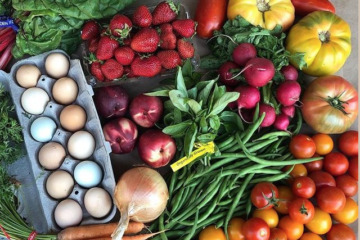Shared Risk, shared reward and shared loss “core value”: In the words of one of my elders that has inspired me once said “Any time you beg another man to set you free, you will never be free. Freedom is something that you have to do for yourselves.”, yes you guessed it, Malcom X.
CSA Is a partnership of mutual commitment between a farmer (or farmers) and a community of members who pledge their support to the farm operation so that the farmland becomes the community’s farm, with the farmers and consumers providing mutual support and sharing the risks and benefits of food production. Members pay upfront for a season by buying “shares” of the farm’s future harvests. This provides the farm with the necessary operating capital to start planting and harvesting cycles and guarantees the farm a stable market for a diverse selection of crops. Through direct sales to their members, growers receive better prices for their crops and are relieved of much of the burden of marketing their products. Members also share in the risks of farming, including poor harvests caused by unfavorable weather, pests or field conditions.
In return, the farm pledges to offer its members weekly “shares” of its harvests. One of the greatest pleasures of eating local organically grown produce comes from knowing that it is grown by farmers who made conscious choices about cultivating their land in environmentally, economically and socially responsible ways. They give us produce which is fresher, healthier, more diverse and more flavorful than industrially grown produce harvested before maturity and shipped over long distances. Participating in a local food system also fosters closer relationships among us, the foods we eat, those who grow it, and the environment we live in. This mutually supportive relationship between local farmers and community members helps create an economically stable farm operation in which members are assured the highest quality produce, often below retail prices.
Our Story
There are many different types of CSAs. Typically, a CSA is managed by a farm where members go to pick up their weekly produce shares. However, in the NE, farms are often not very connected with cities or Urban communities, making this difficult. The GV CSA idea was born as a community initiative in 2009, when 7 Community members of RI and MA entered into an agreement with a new concept to buy collective land and have a housing farm and Community all together. Today, the GV CSA works with 3 farmers, 2 herbalists, 2 healers and many volunteer groups are interested in providing fresh farm products to over 300 families. It acts as an extension of those farmers into the city, offering local produce, bread, cheeses, grass-fed and halal meats, eggs, honey and more, all farmed with organic practices. At the GV Co-op CSA, you always know where your food comes from, who produces it and how. You know that it is naturally grown and humanely raised, with no chemical pesticides, herbicides, fungicides, fertilizers, hormones or antibiotics. And you know that neither people nor the environment are abused in the course of its production. But the most innovative part of this is you get to choose what the farmers will farm and we are committed to create a culturally diverse harvest and planting that respect nature but also religion and costumes and create different shares according to our members needs and capacities.
We will also like to have a country store (food co-op) that is co-op worker/member owned, this year we decided to be part of the black seed market but hope to grow to have our own store, we think that if the workers own the coop and the members manage it, is a way that the customers have a voice and a vote on the decisions of the co-op. We have seen how buying in bulk really makes a difference in price and also the quality of the products and also the shared ownership make the business more resilient to bad economies and avoids bad management.
***Food for thought! What is a hybrid model between Worker Ownership, Member Ownership and CSA Model will look Like?…



0 Comments